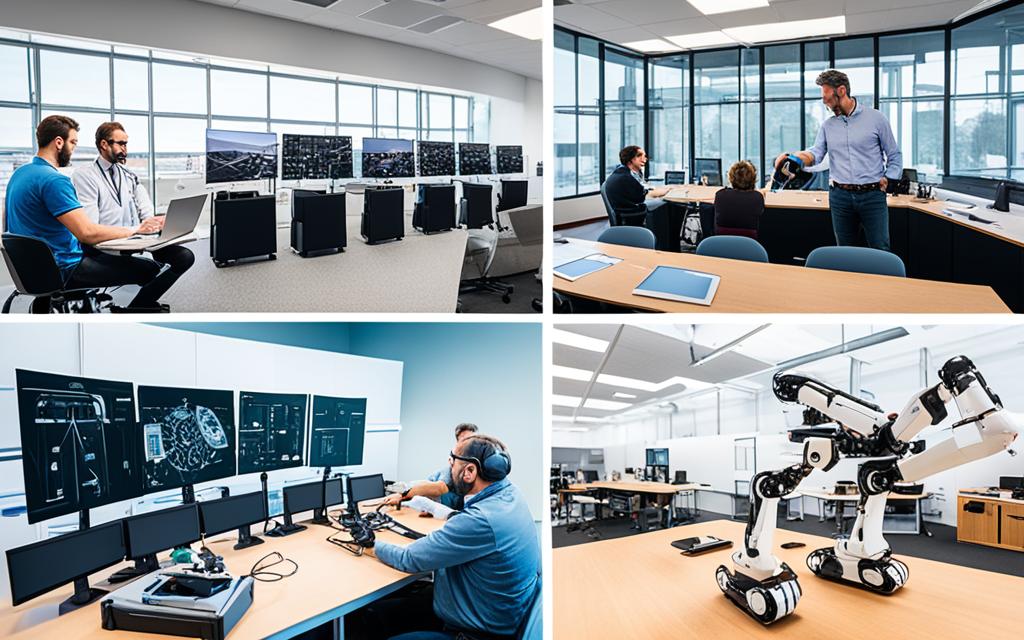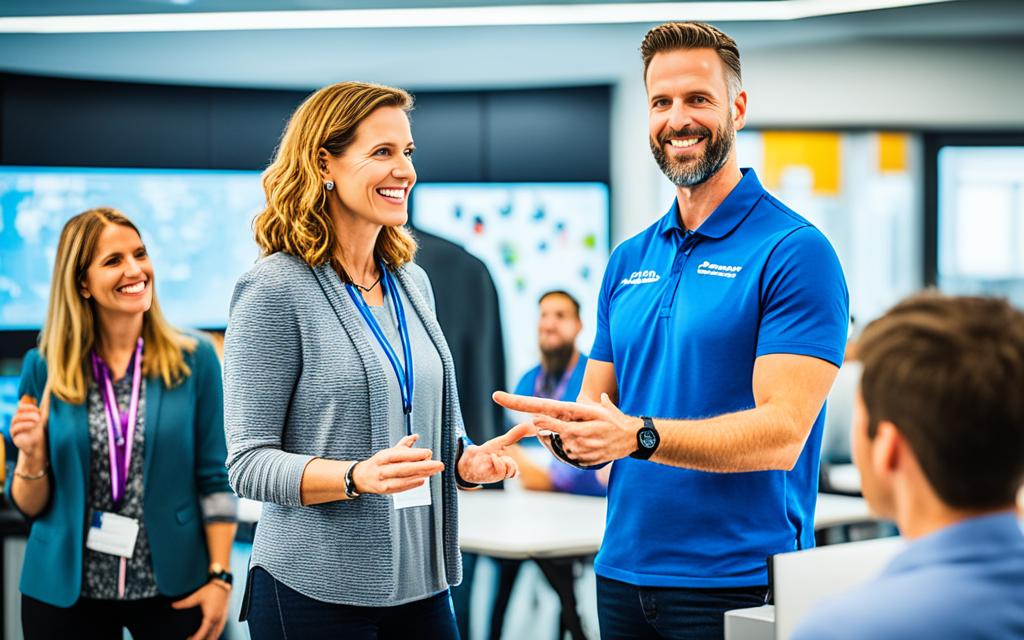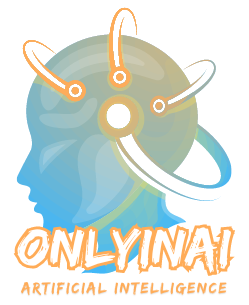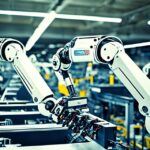The U.S. Career Institute says 65 jobs are safe from AI and automation. They need human skills like social skills, emotional smarts, and the ability to work with others. These jobs are expected to grow a lot by 2032.
Jobs like nurse practitioners, choreographers, and mental health counselors will see big growth. So will physician assistants, nursing instructors, and teachers. These jobs are in healthcare, education, and creative fields. They show the growing need for careers that work well with AI.
Key Takeaways
- The 65 jobs least likely to be replaced by automation due to their human-centric skills are the most future-proof.
- Occupations in healthcare, education, creativity, and personal services are seeing the highest growth as AI-enabled professions.
- Human-centric careers that complement AI capabilities are in high demand for the future workforce.
- Emotional intelligence, social skills, and interpersonal relationships are key differentiators for jobs that will thrive alongside AI.
- Embracing the symbiosis between humans and AI is crucial for career resilience in the evolving job market.
Introduction to AI-Proof Jobs
The future of work is changing fast, thanks to AI and automation. But not all jobs will be taken over by robots. Zippia found that only about 25% of jobs are likely to be fully automated. Another 36% might see big changes or even disappear because of new technology.
It’s key to know which skills will be needed in the future. Careers that value empathy, creativity, and being adaptable will do well. These jobs will work well with AI, making a strong team of humans and machines.
The Rise of AI and Automation
AI is bringing new jobs to the table, but it’s also changing old ones. Some tasks will be done by machines, but humans will always be needed for certain skills. Jobs that need emotional smarts, problem-solving, and dealing with complex issues will be more valuable.
The Need for Human-Centric Careers
Jobs that focus on what makes us human will be the strongest against AI and automation. Careers that value empathy, creativity, and flexibility will do great. These jobs offer services that machines can’t match. By choosing these careers, people can secure their future and work well with AI.
Mental Health Professionals: Empathetic Guardians
As AI and automation grow, mental health stays human-focused. Therapists, counselors, and psychologists are key. They help us emotionally, making them crucial in the future’s AI-proof jobs.
Exploring the Human Psyche
Humans are complex and our emotions are hard for machines to mimic. Mental health pros know this well. They use their training and experience to offer care that fits each person. Their empathy and emotional smarts make them essential in mental health.
Increasing Demand for Mental Health Support
More people now see mental health as important, so the need for these professionals is growing. They help individuals and groups deal with challenges. Their mix of clinical knowledge and empathy makes them vital in the future’s job market.
| Mental Health Professionals | Key Skills |
|---|---|
| Therapists | Empathy, Active Listening, Problem-Solving, Emotional Intelligence |
| Counselors | Interpersonal Communication, Crisis Intervention, Stress Management |
| Psychologists | Research, Assessment, Diagnosis, Behavior Modification |
The need for mental health pros who offer caring support will keep growing. These jobs are key to our emotional health. They ensure a future where human touch and understanding keep mental health care at its core.
Creative Artists and Designers: Shaping Unique Narratives
In the world of tech and automation, creative arts and design stand strong against AI. AI can make beautiful art, but human creative artists and designers add something special. Their work is full of emotion and unique expression.
Painters and graphic designers bring their own touch to their work. This makes their jobs key ai-proof jobs. They can take personal experiences and turn them into art that speaks to us.
Even with all the tech around us, the need for human creativity keeps growing. Creative artists and designers make the stories and designs that touch our hearts. They leave a lasting impact on our world.
As AI takes over more tasks, the importance of human creativity is clear. These people are the dreamers who capture our imaginations. They shape the stories and designs that shape our culture.

Collaboration Between Humans and AI
Nurse practitioners and mental health counselors are great examples. They use AI to help them do their jobs better. AI helps them by analyzing data and giving them insights. This lets them focus on what really matters in their work.
AI as a Creative Tool
AI is a big help in creative jobs too. Choreographers use AI to create new dance moves. This lets them focus on the art and feeling of their work. Physician assistants use AI to help with diagnoses. This means they can spend more time with their patients.
These jobs show how AI and humans can work together in the future. They use technology to make human skills better. This means these professionals can keep leading in their fields and make a big impact.
Skilled Tradespeople: Crafting Solutions
In today’s changing job market, some jobs are standing strong against automation and AI. Jobs like plumbing, carpentry, and electrical work show they can’t be easily replaced. They have a unique skill set that keeps them in demand.
The Irreplaceable Human Touch
Robots are great at doing the same thing over and over, but skilled tradespeople bring something special. They have a touch that can’t be replicated by machines. This touch comes from their deep knowledge and problem-solving skills. They know their tools and materials inside out, making them essential in a world where AI is changing jobs.
Adaptability in the Field
Skilled tradespeople are known for their ability to adapt. When things don’t go as planned, they can think on their feet and come up with creative solutions. This skill keeps them in high demand, even as AI takes over some jobs. Their human touch is still needed in many areas.
| Profession | Key Attributes | Resilience to AI |
|---|---|---|
| Plumbing | Hands-on problem-solving, attention to detail, resourcefulness | High, as plumbing tasks require nuanced expertise and on-site adaptability |
| Carpentry | Craftsmanship, spatial awareness, creativity | High, as carpentry involves intricate, customized work that is difficult to automate |
| Electrical Work | Technical expertise, safety awareness, troubleshooting skills | High, as electrical work requires a deep understanding of complex systems and the ability to respond to unexpected issues |
In conclusion, skilled tradespeople are a key part of our workforce. They bring a human touch and adaptability that AI can’t match. These jobs will always be in demand.
Educators and Trainers: Inspiring Minds

In the changing world of AI and automation, educators and trainers are key. They bring stability and value that AI can’t match. They help us learn in ways that technology can’t.
Educators create a deep bond with their students. They teach more than facts; they help students think deeply, grow personally, and love learning for life. They guide students through tough topics, push them to think differently, and help them reach their goals.
Trainers are crucial too. They teach people the skills they need for their careers. Whether it’s tech skills, leadership, or emotional smarts, trainers use their knowledge and human mentorship to change lives and unlock students’ potential.
With automation changing jobs fast, the value of educators and trainers is huge. They help us think critically, solve problems, and be creative. These skills are key in an AI-driven world.
The need for ongoing learning and skill development is growing. So, the role of educators and trainers will get even more important. They light the way in a world of rapid tech changes. They make sure the human touch stays at the heart of learning and work.
Healthcare Providers: Personalized Care
In the world of artificial intelligence (AI), healthcare providers are key and AI-proof jobs. AI helps with data and precise diagnoses, but doctors, nurses, and therapists can’t be replaced. They need to understand people deeply, show empathy, and build trust with patients. These skills are hard for AI to match.
Beyond Data and Diagnostics
Healthcare workers do more than just treat patients. They give personalized care that meets each patient’s specific needs. They listen well, offer comfort, and aim to grasp the patient’s whole health state. This full view of health is key for the patient’s overall health, something AI can’t do alone.
Building Trust and Rapport
The bond between a healthcare worker and a patient is all about trust and rapport. Patients must feel safe sharing their deepest worries. Workers must answer with care, empathy, and real concern. This connection is key for good treatment and the patient’s long-term health. As AI gets better, healthcare workers will keep being vital. They make sure personalized care stays central in healthcare.
Research Scientists: Pioneers of Discovery
In today’s fast-paced world, research scientists are key players. AI can handle lots of data, but curiosity, intuition, and serendipitous thinking are uniquely human. These traits lead to big discoveries. Research scientists are vital for moving forward in knowledge and tech.
The work in research and innovation is an ai-proof job. Here, human smarts and creativity are essential. Scientists use their human curiosity to explore new areas and find hidden truths. They challenge old ideas and seek new solutions, making their skills unmatched in finding groundbreaking discoveries.
With AI getting more common, the importance of research scientists grows. They drive innovation and lead in creating new tech. Their skill in seeing the big picture, linking different ideas, and making sense of complex info makes them the true leaders of discovery today.
| Skill | Importance for Research Scientists |
|---|---|
| Critical Thinking | Enables research scientists to analyze problems from multiple angles, challenge assumptions, and develop innovative solutions. |
| Creativity | Fosters the ability to generate novel ideas, explore unconventional approaches, and uncover groundbreaking discoveries. |
| Adaptability | Allows research scientists to navigate the dynamic landscape of research, respond to emerging trends, and embrace new methodologies. |
| Collaboration | Facilitates the exchange of ideas, the integration of diverse perspectives, and the advancement of collaborative research projects. |
Looking ahead, the role of research scientists will be even more crucial. Their power to use human curiosity, spark innovation, and make new discoveries will keep shaping science. They will remain vital ai-proof jobs in the future.
Human Resources Professionals: Nurturing Talent
In today’s fast-changing world, human resources (HR) professionals are key players. They do more than just handle data. They protect the heart of a company, manage people, and grow talent. These tasks are all about people and can’t be replaced by AI.
Fostering Organizational Culture
HR pros are key in building a company’s culture. They know how to weave together relationships, values, and behaviors at work. By creating a positive and welcoming space, they make sure everyone feels part of the team. This leads to better work and happier employees.
Mediating Conflicts and Dynamics
Handling team conflicts needs a lot of insight into human nature. HR experts are great at solving these issues. They help people talk things out and keep the work environment peaceful and productive.
Human resources professionals will always be needed as the job market changes. Their skills in talent nurturing, organizational culture, and conflict mediation mean they’re set to succeed in the AI era of ai-proof jobs.
Legal Professionals: Ethical Guardians
In the world of tech growth, legal experts stand out as guardians of human skill and moral decision-making. AI tools help with some tasks, but the core of legal work like critical thinking and justice is uniquely human.
Lawyers and legal advisors need deep law knowledge and top-notch negotiation, advocacy, and moral judgment skills. This mix of knowledge and judgment is key in the complex legal world. It keeps legal strategy and human judgment leading in ethical decision-making.
AI-proof jobs like those of legal professionals will stay vital, protecting justice and rights for people and groups. They blend tech tools with their deep law knowledge and ethical commitment. This keeps justice in human hands.
Legal professionals are crucial in drafting contracts, handling complex cases, or fighting for their clients’ rights. Their skill in applying the law with precision and their strong ethical commitment makes them key in the AI era.
Embracing Human-AI Synergy
The age of artificial intelligence and automation is growing. Not all jobs will be replaced by machines. Jobs that need empathy, creativity, and ethical decision-making will thrive with AI.
These jobs are in healthcare, education, the arts, and research. They show the need for human skills that AI can’t replace. These careers will grow as AI becomes more common.
Working with AI can make careers more secure and help shape a workforce that uses technology and human skills together. The future is about more than just new tech. It’s also about the unique touch we add to our work.
As jobs change, it’s important to see the value in working with AI. We should focus on careers that use our unique human strengths. This way, we can work in a changing world while keeping our careers meaningful and fulfilling.


